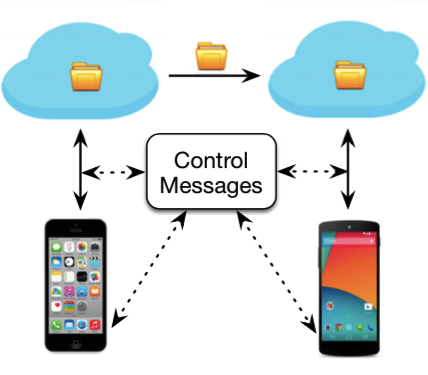Research Projects
-

This paper investigates the routing protocols in smartphone-based mobile Ad-Hoc networks. We introduce a new dual radio communication model, where a long-range, low cost, and low rate radio is integrated into smartphones to assist regular radio interfaces such as WiFi and Bluetooth. We propose to use the long-range radio to carry out small management data packets to improve the routing protocols. Specifically, we develop new schemes to improve the efficiency of the path establishment and path recovery process in the on-demand Ad- Hoc routing protocols. We have prototyped our solution LAAR on Android phones and evaluated the performance with small-scale experiments and large-scale simulation implemented on NS2. The results show that LAAR significantly improves the performance.
-

Smartphones have become more and more popular in the past few years. Motivated by the fact that location plays an extremely important role in mobile applications, this paper develops an efficient local message dissemination system PASA based on a new communication model called passive broadcast. In this new model, each node does not maintain connection state and data delivery is initialized by a receiver via a ‘scan’ operation. The representative carriers of passive broadcast include Bluetooth and WiFi-Direct, both of which define a mandatary ‘peer discovery’ scan function. Passive broadcast features negligible cost for establishing and maintaining direct links and is extremely suitable for short message dissemination in the proximity. In this paper, we present PASA with complete protocols and in- depth analysis for optimization. We have prototyped our solution on commercial phones and evaluated it with comprehensive experiments and simulation.
-

This paper targets the application of cloud storage management for mobile devices. Because of the limit of band- width and other resources, most existing cloud storage apps for smartphones do not keep local copies of files. This efficient design, however, limits the application capacities. In this paper, our goal is to extend the available file operations for cloud storage service to better serve smartphone users. We develop Skyfiles, an efficient and secure file management system that supports more advance file operations. Our basic idea is to utilize cloud instance to assist file operations. Particularly, Skyfiles supports download, compress, encrypt, convert operations, and file transfer between two smartphone users’ cloud storage spaces. In addition, we design protocol for users to share their idle instances. All file operations designed in Skyfiles can be efficiently and securely accomplished with a self-created instance or shared instance.
-

Hadoop is an emerging framework for parallel big data processing. While becoming popular, Hadoop is too complex for regular users to fully understand all the system parameters and tune them appropriately. Especially when processing a batch of jobs, default Hadoop setting may cause inefficient resource utilization and unnecessarily prolong the execution time. This paper considers an extremely important setting of slot configuration which by default is fixed and static. We proposed an enhanced Hadoop system called FRESH which can derive the best slot setting, dynamically configure slots, and appropriately assign tasks to the available slots. The experimental results show that when serving a batch of MapReduce jobs, FRESH significantly improves the makespan as well as the fairness among jobs.